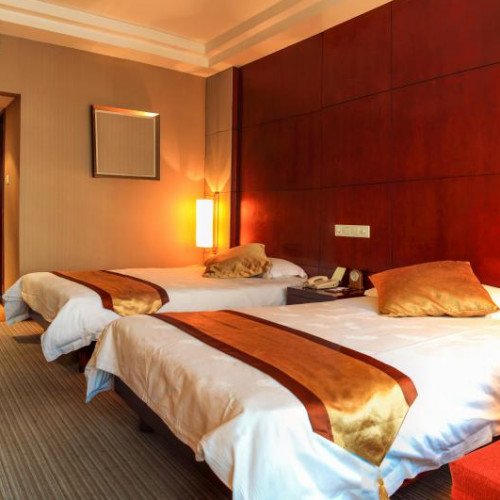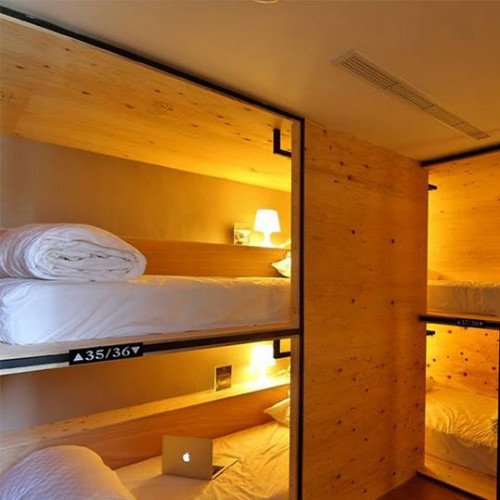Hotel or Hostel?

Hotel
A hotel is an establishment that provides paid lodging on a short-term basis. Facilities provided inside a hotel room may range from a modest-quality mattress in a small room to large suites with bigger, higher-quality beds, a dresser, a refrigerator and other kitchen facilities, upholstered chairs, a flat screen television, and en-suite bathrooms. Small, lower-priced hotels may offer only the most basic guest services and facilities. Larger, higher-priced hotels may provide additional guest facilities such as a swimming pool, business centre (with computers, printers, and other office equipment), childcare, conference and event facilities, tennis or basketball courts, gymnasium, restaurants, day spa, and social function services. Hotel rooms are usually numbered (or named in some smaller hotels and B&Bs) to allow guests to identify their room. Some boutique, high-end hotels have custom decorated rooms. Some hotels offer meals as part of a room and board arrangement. In the United Kingdom, a hotel is required by law to serve food and drinks to all guests within certain stated hours. In Japan, capsule hotels provide a tiny room suitable only for sleeping and shared bathroom facilities. The precursor to the modern hotel was the inn of medieval Europe. For a period of about 200 years from the mid-17th century, coaching inns served as a place for lodging for coach travelers. Inns began to cater to richer clients in the mid-18th century. One of the first hotels in a modern sense was opened in Exeter in 1768. Hotels proliferated throughout Western Europe and North America in the early 19th century, and luxury hotels began to spring up in the later part of the 19th century. Hotel operations vary in size, function, complexity, and cost. Most hotels and major hospitality companies have set industry standards to classify hotel types. An upscale full-service hotel facility offers luxury amenities, full-service accommodations, an on-site restaurant, and the highest level of personalized service, such as a concierge, room service, and clothes pressing staff. Full-service hotels often contain upscale full-service facilities with many full-service accommodations, an on-site full-service restaurant, and a variety of on-site amenities. Boutique hotels are smaller independent, non-branded hotels that often contain upscale facilities. Small to medium-sized hotel establishments offer a limited amount of on-site amenities. Economy hotels are small to medium-sized hotel establishments that offer basic accommodations with little to no services. Extended stay hotels are small to medium-sized hotels that offer longer-term full-service accommodations compared to a traditional hotel. Timeshare and destination clubs are a form of property ownership involving ownership of an individual unit of accommodation for seasonal usage. A motel is a small-sized low-rise lodging with direct access to individual rooms from the car park. Boutique hotels are typically hotels with a unique environment or intimate setting. A number of hotels have entered the public consciousness through popular culture, such as the Ritz Hotel in London. Some hotels are built specifically as destinations in themselves, for example casinos and holiday resorts. Most hotel establishments are run by a General Manager who serves as the head executive (often referred to as the "Hotel Manager"), department heads who oversee various departments within a hotel (e.g., food service), middle managers, administrative staff, and line-level supervisors. The organizational chart and volume of job positions and hierarchy varies by hotel size, function and class, and is often determined by hotel ownership and managing companies.
Statistics for this Xoptio

Hostel
A hostel is a form of low-cost, short-term shared sociable lodging where guests can rent a bed, usually a bunk bed in a dormitory, with shared use of a lounge and sometimes a kitchen. Rooms can be mixed or single-sex and have private or shared bathrooms. Private rooms may also be available, but the property must offer dormitories to be considered a hostel. Hostels are popular forms of lodging for backpackers, cycle tourists, and gap year travelers. They are part of the sharing economy. Benefits of hostels include lower costs and opportunities to meet people from all over the world, find travel partners, and share travel ideas. such as Zostel in India or Hostelling International, caters to a niche market of travelers. For example, one hostel might feature in-house social gatherings such as movie nights or communal dinners, another might feature local tours, one might be known for its parties, and another might have a quieter place to relax in serenity, or be located on the beach. Newer hostels focus on a more trendy design interior, some of which are on par with boutique hotels. Some may cater to older digital nomads, global nomads, and perpetual travelers that prefer slightly more upmarket private rooms or a quieter atmosphere.Many hostels are locally owned and operated, and are often cheaper for both the operator and occupants than hotels. Hostels may offer long-term lodging to guests for free or at a discount in exchange for work as a receptionists or in housekeeping. There are approximately 10,000 hostels in Europe and approximately 300 hostels in the United States. The typical guest is between 16 and 34 years old.In addition to shared kitchen facilities, some hostels have a restaurant and/or bar. Washing machines and clothes dryers are often provided for an additional fee. Hostels sometimes have entryways for storing gear. Most hostels offer lockers for safely storing valuables. Some offer yoga studios, cinemas, rooftop clubs, and surf camps. Some bare-bones hostels do not provide linens. Some hostels may have a curfew and daytime lockouts, and some, albeit few, require occupants to do chores apart from washing and drying up after food preparation.A mobile hostel is a temporary hostel that can take the form of a campsite, bus, van, or a short term arrangement in a permanent building. They have been used at large festivals where there is a shortage of lodging.In some cities, hostels reported a higher average income per room than hotels. For example, in Honolulu, Hawaii, upscale hotels reported average daily room rates of $173 in 2006, while hostel rooms brought in as much as $200 per night, for rooms of 8 guests paying $25 each. Even during the financial crisis of 2007–2008, many hostels reported increased occupancy numbers in a time when hotel bookings are down.A 2013 study in Australia showed that youth travel was the fastest growing travel demographic and that the hostel industry was growing at a faster rate than the hotel industry. It showed that youth travel can lead to higher overall spending due to longer trips than traditional vacations. In New Zealand, backpackers hostels had a 13.5% share of lodging guest/nights in 2007.